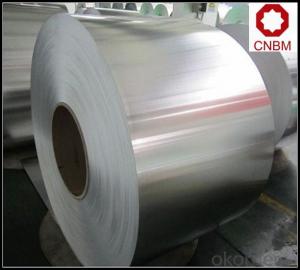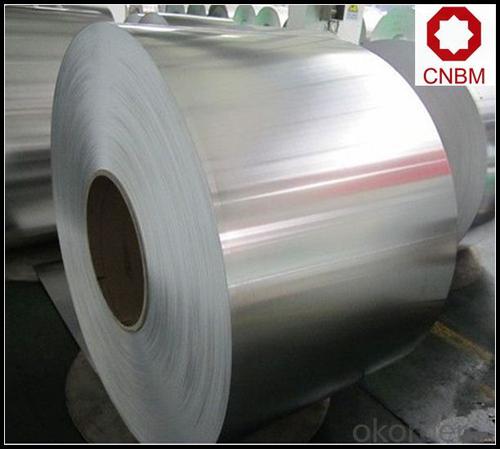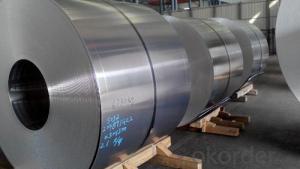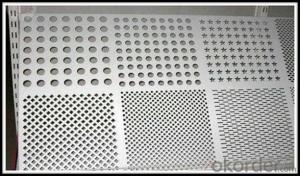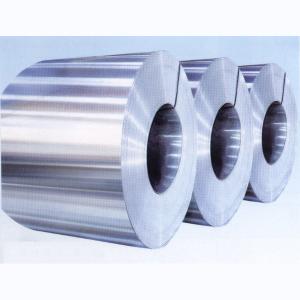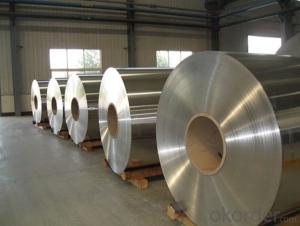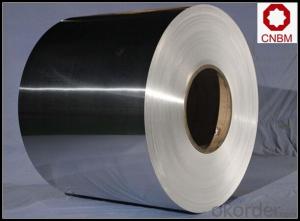Mill Finish Cost Price Aluminum Kick Plate Coil 1 Series
- Loading Port:
- Shanghai
- Payment Terms:
- TT OR LC
- Min Order Qty:
- 5 m.t.
- Supply Capability:
- 10000 m.t./month
OKorder Service Pledge
OKorder Financial Service
You Might Also Like
Specification
1. Specification of Mill Finish Cost Price Aluminum Coil
1) Alloy | 1050, 1060,1100, 3003 3004 3105 3A21 5005 5052 etc |
2) Temper | O/H12/H14/H1/H18/H32/H34/H36/H38//H111/H112/H116/H321/T6/T651/T3/T351 etc |
3) Thickness | 0.1mm to 6mm |
4) Width | 20mm to 3300mm |
5) Coil weight | 100kgs to 6 tons depends on actual requirement |
6) Core material | Aluminum or paper |
7) Coil Inner diameter | 75mm, 150mm, 200mm, 300mm, 405mm, 505mm or as required |
8) Protective film can be added
2. Application of Mill Finish Cost Price Aluminum Coil
(1).Interior: wall cladding, ceilings, bathrooms, kitchens and balconies, shutters, doors...
(2).Exterior: wall cladding, facades, roofing, canopies, tunnels,column covers , renovations...
(3).Advertisement: display platforms, signboards, fascia, shop fronts...
3. Feature of Mill Finish Cost Price Aluminum Coil
*Such coil is specially designed to replace aluminum ingot, due to the high export tax of aluminum ingot, the coil has better price than ingot.
*This type of coil can fit customer's remelting furnace just like ingot, no need to make any change to the production line that was previously used for ingot. The standard coil size and weight is very suitable for the feed gate of furnace.
*This type of coil causes less material wastage than ingot when remelted.
*Our coil is made directly from ore, no need to go though the ingot making process, quality is much better than other suppliers who use ingot scrap to make coil.
Be free from Oil Stain, Dent, Inclusion, Scratches, Stain, Oxide Dicoloration, Breaks, Corrosion, Roll Marks, Dirt Streaks and other defect which will interfere with use
4. Certificate
SGS and ROHS(if client request, paid by client), MTC(plant provided), Certificate of Origin(FORM A, FORM E, CO), Bureau Veritas and SGS (if client request, paid by client), CIQS certificate
5. Image of Mill Finish Cost Price Aluminum Coil
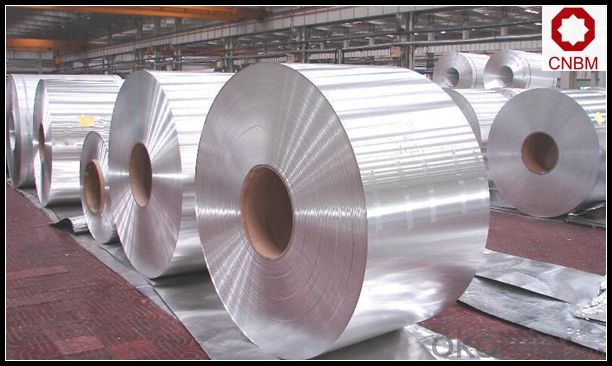
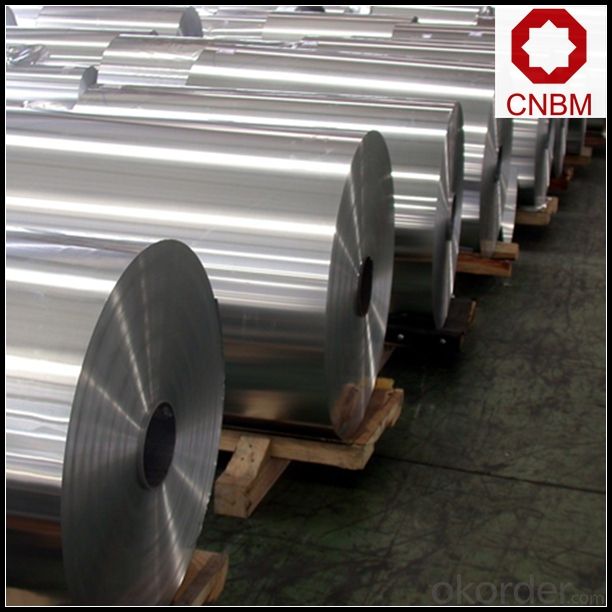
6. Package and shipping of Mill Finish Cost Price Aluminum Coil
eye to wall
eye to the wall
with wood pallet (wooded case also available)
7. FAQ
1) What is the delivery time?
Dpends on actual order, around 20 to 35 days
2)What is the QC system:
We have QC staff of 20 persons and advanced equipment, each production is with MTC traced from Aluminum ingot lot.
3) What market do you mainly sell to?
Australia, America, Asia, Middle East, Western Europe, Africa etc
- Q: Is it possible to use a soldering iron to join aluminum coil with solder?
- <p>Traditional soldering irons are not suitable for soldering aluminum coils because aluminum does not readily bond with common solders used for irons. Aluminum has a high oxide layer that forms quickly, which prevents the solder from adhering. Specialized aluminum solder or fluxes are required for this task, and even then, the process might not be as effective as with other metals. For aluminum, brazing or welding techniques are often more appropriate.</p>
- Q: im looking for a bat but i dont know what to get wood or aluminum what is harder wood or aluminum ?? what would be better for hitting hard balls with ( or maybe people ) haha no im joking i need help !!!!
- aluminum is, and hardness isnt everything.. theres bat speed, vibration differences after the swing, wider sweet spots, and durability. aluminum bats dominate wood bats in all these catergories
- Q: What is the role of aluminum coils in the automotive industry?
- Aluminum coils play a significant role in the automotive industry, particularly in the manufacturing of vehicles. These coils are used in the production of various components and parts, such as radiators, condensers, and air conditioning systems. One of the main reasons aluminum coils are preferred in the automotive industry is their lightweight nature. Aluminum is significantly lighter than other metals, such as steel, making it an ideal choice for improving fuel efficiency and reducing overall vehicle weight. This not only enhances the performance of the vehicle but also reduces emissions, contributing to a more environmentally friendly transportation sector. Additionally, aluminum coils offer excellent thermal conductivity, which is crucial in automotive applications. They help dissipate heat efficiently, ensuring the proper functioning of cooling systems and preventing overheating. This is particularly important for components like radiators, where effective heat transfer is essential to maintain optimal engine temperature. Furthermore, aluminum coils are highly corrosion-resistant. They have a natural oxide layer that protects against rust and corrosion, making them more durable and long-lasting than other metals. This resistance to corrosion is vital in the automotive industry, where vehicles are exposed to various environmental factors, such as moisture, salt, and chemicals. Aluminum coils also provide design flexibility. They can be easily shaped and formed into different sizes and configurations, allowing manufacturers to create complex and customized components. This flexibility in design enables automotive companies to optimize space and maximize efficiency in their vehicles. In summary, aluminum coils have a crucial role in the automotive industry. Their lightweight nature, excellent thermal conductivity, corrosion resistance, and design flexibility make them an ideal choice for various automotive applications, contributing to improved performance, fuel efficiency, and overall durability of vehicles.
- Q: How do aluminum coils contribute to the corrosion resistance of marine applications?
- Aluminum coils play a crucial role in enhancing the corrosion resistance of marine applications. This is primarily due to the unique properties and characteristics of aluminum as a material. Firstly, aluminum has a natural oxide layer that forms on its surface when exposed to air, which is highly resistant to corrosion. This oxide layer acts as a protective barrier that prevents further oxidation and corrosion of the metal. This inherent property of aluminum makes it an ideal choice for marine applications, where constant exposure to saltwater and moisture can be highly corrosive. Furthermore, aluminum coils can be alloyed with other elements such as magnesium and manganese to further enhance their corrosion resistance. These alloying elements not only strengthen the aluminum but also improve its resistance to pitting and crevice corrosion. Pitting corrosion occurs when localized damage to the oxide layer exposes the underlying metal, while crevice corrosion occurs in areas where oxygen is restricted, such as gaps or joints. By alloying aluminum, the coils become more resistant to these types of corrosion, making them highly suitable for marine environments. Moreover, aluminum coils can be coated with protective finishes such as anodizing or painting, which provide an additional layer of protection against corrosion. Anodizing involves creating a thicker and more durable oxide layer on the aluminum surface, thereby increasing its resistance to corrosion. Painting, on the other hand, acts as a physical barrier that shields the coils from direct contact with corrosive elements present in the marine environment. In conclusion, aluminum coils contribute to the corrosion resistance of marine applications through their natural oxide layer, alloying with other elements, and the option of protective finishes. These characteristics make aluminum coils highly durable and capable of withstanding the harsh conditions encountered in marine environments, ensuring their longevity and reliability.
- Q: How do aluminum coils contribute to improved building aesthetics?
- Aluminum coils contribute to improved building aesthetics in several ways. Firstly, aluminum coils can be used to create sleek and modern exterior finishes for buildings. The coils can be coated with various finishes such as brushed, anodized, or painted, allowing for a wide range of design possibilities. This versatility in finishes helps architects and designers achieve their desired aesthetic vision for the building. Additionally, aluminum coils can be easily shaped and formed into various profiles, giving buildings a unique and customized look. The coils can be bent, cut, or perforated to create intricate patterns or architectural details, enhancing the overall aesthetics of the structure. This flexibility in shaping allows for creative and visually appealing designs that can make a building stand out. Moreover, aluminum coils are lightweight yet durable, making them an ideal choice for cladding systems. By using aluminum coils as exterior cladding, buildings can achieve a modern and clean appearance. The lightweight nature of aluminum coils also makes installation easier and more cost-effective, ultimately contributing to improved building aesthetics. Furthermore, aluminum is a highly recyclable material, which aligns with sustainable building practices and environmentally friendly designs. Buildings incorporating aluminum coils can be seen as more visually appealing due to their eco-friendly attributes, reflecting the values of the project and its occupants. In conclusion, aluminum coils contribute to improved building aesthetics by providing a wide range of finishes, allowing for creative shaping and customization, offering lightweight and durable cladding options, and promoting sustainable design practices.
- Q: What are the different sizes and dimensions of aluminum coils available?
- The sizes and dimensions of aluminum coils vary depending on the specific industry and application. Generally, aluminum coils are available in a range of widths, thicknesses, and lengths to accommodate various needs. In the construction industry, aluminum coils are commonly available in widths ranging from 24 inches to 60 inches. The thicknesses can range from 0.019 inches to 0.040 inches. The lengths of the coils can vary, but standard lengths are typically around 100 feet or more. For industrial and manufacturing purposes, the sizes and dimensions of aluminum coils can be even more diverse. Coils with widths exceeding 60 inches are available for large-scale applications. The thicknesses can range from 0.006 inches for thin, lightweight coils to 0.250 inches for heavy-duty applications. Additionally, the dimensions of aluminum coils can be customized to meet specific requirements. Some manufacturers offer coil slitting services to cut coils into narrower widths, while others can provide custom lengths or thicknesses based on the customer's specifications. It is important to note that the availability of different sizes and dimensions may vary among suppliers. Therefore, it is advisable to consult with a reputable aluminum coil supplier or manufacturer to determine the specific sizes and dimensions they offer.
- Q: How do you store and transport aluminum coils?
- Aluminum coils are typically stored and transported in a variety of ways depending on their size and weight. They are commonly stored in warehouses or outdoor yards, either horizontally on racks or vertically on stands. To prevent damage and ensure stability, aluminum coils are often stacked securely and separated by wooden blocks or spacers. When it comes to transportation, aluminum coils are usually loaded onto flatbed trucks or shipping containers. They may be secured with straps or chains to prevent movement during transit and to ensure their safe delivery to the desired destination.
- Q: Can aluminum coils be used in signage applications?
- Yes, aluminum coils can be used in signage applications. Aluminum is a popular material for signage due to its durability, lightweight nature, and resistance to corrosion. It can be easily formed into various shapes and sizes, making it suitable for different types of signage, including billboards, nameplates, and outdoor signs. Additionally, aluminum can be painted or laminated to achieve different visual effects and enhance the overall appearance of the signage.
- Q: Can aluminum coils be used for signage and display applications?
- Yes, aluminum coils can be used for signage and display applications. Aluminum is a versatile and lightweight material that is widely used in the signage industry. Aluminum coils can be easily formed into various shapes and sizes, making them suitable for a variety of signage and display applications. Aluminum coils are commonly used for outdoor signs, such as billboards, building signs, and traffic signs, due to their excellent weather resistance and durability. They can withstand harsh weather conditions, including rain, snow, and UV exposure, without rusting or fading. This makes them a reliable choice for long-lasting signage. Additionally, aluminum coils can be coated with a variety of finishes, such as paint or powder coating, to enhance their appearance and provide additional protection against corrosion. This allows for customization and branding options, making aluminum coils suitable for both functional and decorative signage. In terms of display applications, aluminum coils can be used to create exhibition stands, trade show displays, retail displays, and various other promotional materials. Their lightweight nature makes them easy to transport, assemble, and disassemble, which is beneficial for portable displays. Furthermore, aluminum coils can be easily printed on or laminated, allowing for the incorporation of graphics and visuals to attract attention and convey messages effectively. Overall, aluminum coils are a versatile and durable material that can be used for a wide range of signage and display applications. Their weather resistance, customizable finishes, and lightweight properties make them a popular choice in the industry.
- Q: What is the typical conductivity of aluminum coils?
- The typical conductivity of aluminum coils is high, ranging from approximately 35 to 40 million Siemens per meter (MS/m).
Send your message to us
Mill Finish Cost Price Aluminum Kick Plate Coil 1 Series
- Loading Port:
- Shanghai
- Payment Terms:
- TT OR LC
- Min Order Qty:
- 5 m.t.
- Supply Capability:
- 10000 m.t./month
OKorder Service Pledge
OKorder Financial Service
Similar products
Hot products
Hot Searches
Related keywords
